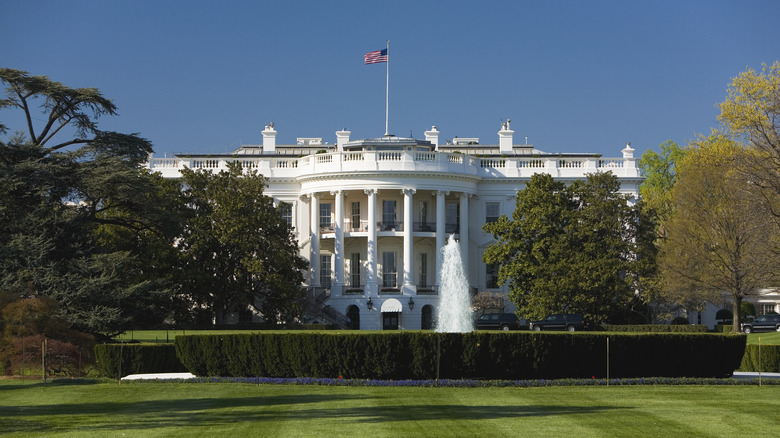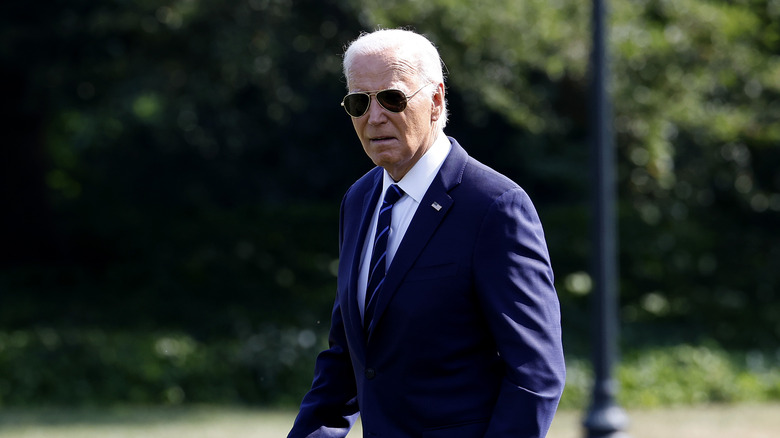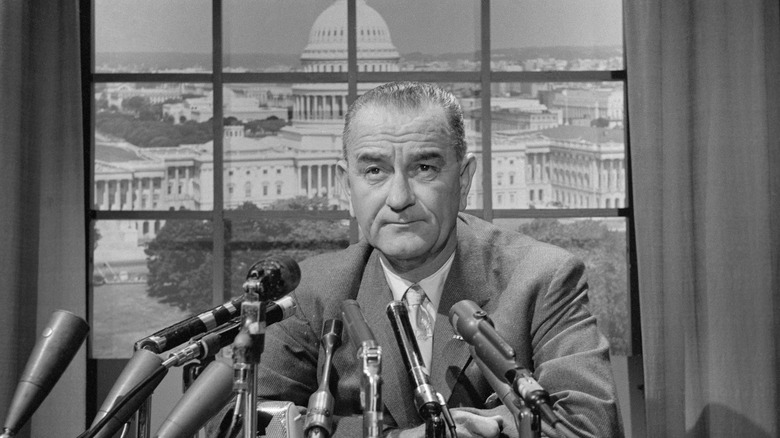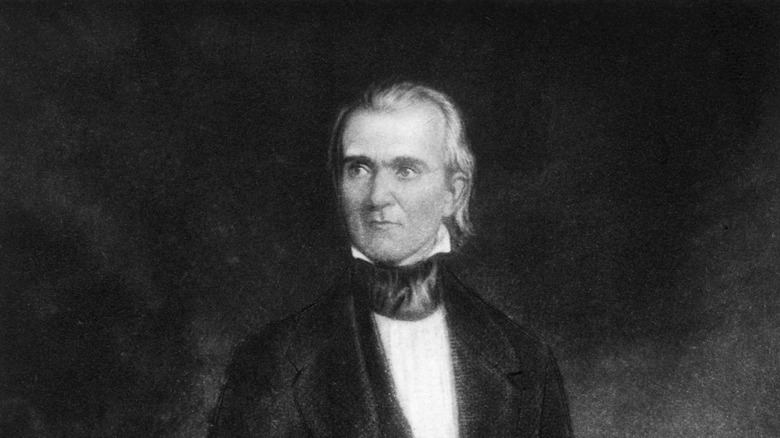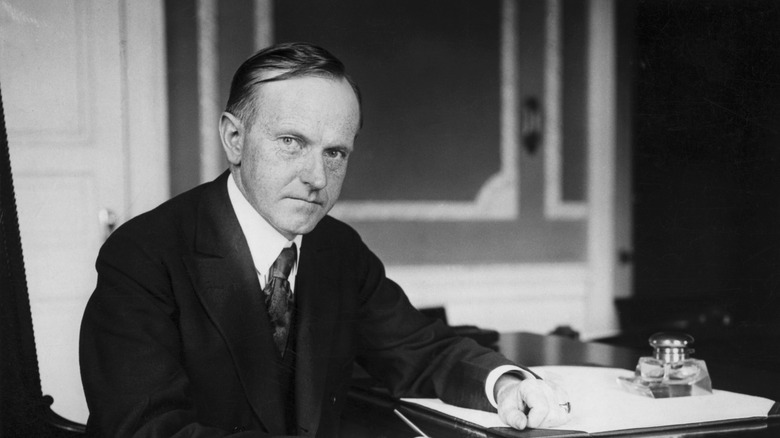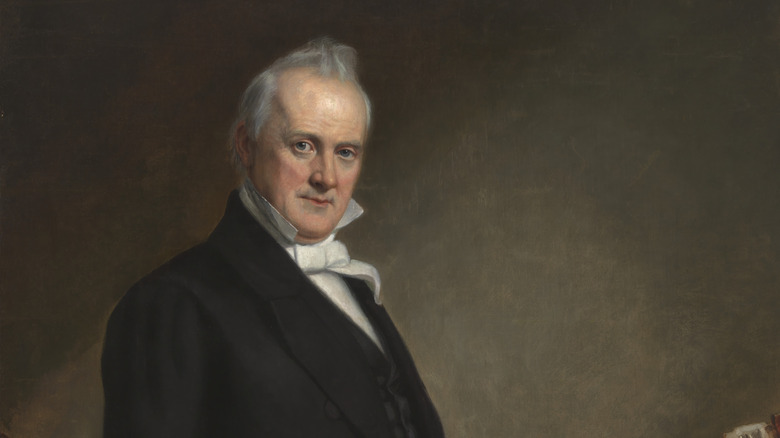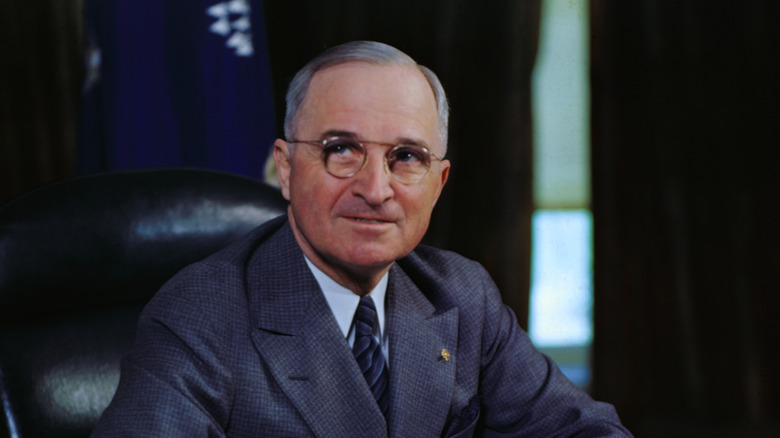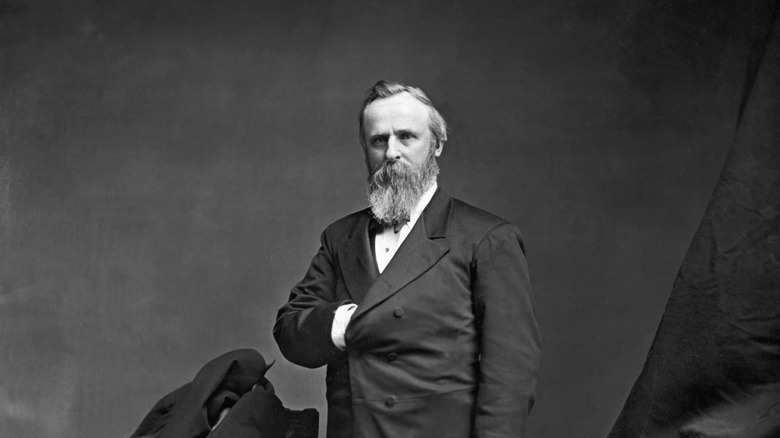All The U.S. Presidents Who Refused A Second Elected Term
The United States has always been a hotbed of ruthless politics. Many presidents had to fight tooth and nail for the White House. George W. Bush took office after a bitter and contested election dispute with Al Gore, one of the closest United States elections that is contested to this day. Others fought hard for a second term — one-time president Donald Trump denied the results of the 2020 election in a flurry of chaos that led to the infamous Capitol riots on January 6, 2021. Others refused a second term altogether.
Through the years, there have been just seven who have willingly stepped down after serving one elected term in the White House: Lyndon B. Johnson, James K. Polk, James Buchanan, Rutherford B. Hayes, Calvin Coolidge, Harry S. Truman, and most recently, Joe Biden. Here's the story behind each of these political figures who decided to leave their position of leadership.
Joe Biden
The most recent president to refuse a second term is Joe Biden, who announced he would be stepping down on July 21, 2024 in a letter shared on X (formerly known as Twitter). The news came after years of speculation about his mental and physical health. He was 81 years old when he dropped out of his bid for another stint in the White House, turning 82 in November the same year. Despite years of rumors about his purported decline, calls for his resignation only surfaced in a big, public way after the first presidential debate of the 2024 election season. His performance — in which he was at times incoherent and appeared in a daze — was labeled "disastrous" by many media outlets.
Democrats in Congress began calling on him to drop out. Former president Barack Obama reportedly told allies Biden should reconsider his campaign. Speaker Emerita Nancy Pelosi allegedly urged him to step down. It appears the pressure worked, though it's unclear who will take his place as of this writing.
Lyndon B. Johnson
Before Joe Biden, the most recent president to refuse a second term was Lyndon B. Johnson, the 36th head of state. "I shall not seek, and I will not accept, the nomination of my party for another term as your president," he told audiences in a televised broadcast on March 31, 1968. According to Britannica, Johnson knew victory was unlikely. His approval ratings took a nosedive in the mid-1960s — from 70% in mid-1965 to under 40% by 1967. Under his leadership, the United States entered the Vietnam War, which became unpopular among Americans and eventually even its troops. By 1968, the country had already lost 30,000 soldiers and had 548,000 more still stationed there.
Per the U.S. National Archives, 58,220 Americans died in the conflict, which ended in 1975. After Senator Eugene McCarthy and Robert Kennedy entered the race for the Democratic nomination, Johnson made his announcement, in which he outlined steps to limit the war. "We are prepared to move immediately toward peace through negotiations," he said. "So, tonight, in the hope that this action will lead to early talks, I am taking the first step to de-escalate the conflict. We are reducing-substantially reducing — the present level of hostilities." On January 22, 1972, he died of a heart attack at his Texas ranch, one day after learning about peace in Vietnam. Five days later, on January 27, South Vietnam, North Vietnam, South Vietnam, and the United States signed the Paris Peace Accords, officially titled, "Agreement on Ending the War and Restoring Peace in Vietnam."
James K. Polk
James K. Polk, the 11th — and possibly most underrated — president of the United States, pledged to only serve one term in office after he was nominated as a presidential candidate in 1844. He fulfilled his campaign promise when he declined to run again in 1848, becoming the first president to step down voluntarily. According to the Miller Center, he could have "easily" been nominated again. In his diary, though, he seemed content with the decision. "I feel exceedingly relieved that I am now free from all public cares," he wrote, per "America's First Families." "I am sure I shall be a happier man in my retirement than I have been during the four years I have filled the highest office."
Polk died over three months later on June 15, 1849, of cholera. The disease spreads through contaminated food and water, and at the time, treatments like laxatives and leeches dehydrated patients only aggravated the issue. Many suggest Polk's excessive work ethic during his presidency destroyed his health, though with modern medicine his death would likely have been preventable.
Calvin Coolidge
Calvin Coolidge, known for his honesty, work ethic, and passion for business, was the 30th president of the United States. Though he was in a good position to win a second term — he was extremely popular — mental health issues prompted him to retire to Northampton. "I do not choose to run for president in 1928," he said in a statement to the press the same year. In "The Autobiography of Calvin Coolidge," he touched on his reasoning. "While I had a desire to be relieved of the pretensions and delusions of public life, it was not because of any attraction of pleasure or idleness," he wrote. "We draw our Presidents from the people. It is a wholesome thing for them to return to the people. I came from them. I wish to be one of them again."
Coolidge was also deeply mourning the death of his 16-year-old son, Calvin Jr., who died from an infection in 1924, at a time before penicillin was discovered. "It has always seemed to me that the boy I lost was her image" he said, referring to his mother, Victoria (per Calvin Coolidge Presidential Foundation). She and his younger sister, Abbie, both died when he was young. According to The Atlantic, Calvin suppressed his emotions during this time, and when his son died, he experienced major depression for the next four years of his presidency. He died on January 5, 1933, of coronary thrombosis at his Northampton home at 60 years old.
James Buchanan
James Buchanan was the 15th president of the United States. Like James K. Polk before him, he had also pledged to serve only one term, this time during his inaugural address. Buchanan is consistently ranked by historians as one of the worst presidents for fueling divisions over slavery — sometimes by siding with owners of enslaved people, other times by attempting to placate white Americans. He claimed to take no side on the issue, but his rhetoric was no help during his time in office from 1857 to 1861 in the lead-up to the Civil War.
He left office on March 4, 1861, and headed to his Pennsylvania home Wheatland, where Tulane University says he was "weary and happy to be relieved of his duties." The Civil War began just over a month later on April 12 1861. He died on June 1, 1868, at age 77 from respiratory failure brought on by a cold and complications of old age.
Harry S. Truman
Harry S. Truman was the 33rd U.S. president, and he stepped down amid poor polling numbers. Though he technically served almost two terms, becoming president after the unexpected death of his predecessor, Franklin D. Roosevelt, he only served one elected term, after which he refused another. A month before his decision, a February 1952 Gallup survey put his approval rating at just 22% — an all-time low. Approximately 64% of Americans disapproved of the head of state. According to the pollster, his average job approval rating after leaving office was 45.4%, which was the lowest for any post-World War II president until Doanld Trump left the White House in 2021 with a 41.1% average.
"I have served my country long, and I think effectively and honestly," he said upon announcing he would not run for another term in March 1952, per Politico. In his farewell address January 15, 1953, he expressed pride over his accomplishments and legacy. "We have made progress in spreading the blessings of American life to all of our people," he said in a broadcast from the Oval Office on January 15, 1953, per the National Archives. "There has been a tremendous awakening of the American conscience on the great issues of civil rights — equal economic opportunities, equal rights of citizenship, and equal educational opportunities for all our people, whatever their race or religion or status of birth." Truman died of cardiovascular system collapse on December 26, 1972. He was 88.
Rutherford B. Hayes
The United States' 19th president, Rutherford B. Hayes, like many other presidents, was happy to leave office. According to the Rutherford B. Hayes Presidential Library & Museums, by the end of his political career — he served in Congress and did three terms as Ohio's governor — he "yearned" to leave public life behind. Like James K. Polk and James Buchanan, Hayes had already promised to serve only one term. And so he left office on March 4 1881, and again like many others, retired to his home — Spiegel Grove in Fremont, Ohio. On January 17, 1893, he died of heart disease.
Hayes was one of the most controversial presidents. He entered the White House in 1877 in the aftermath of the Civil War that ended in 1865 and the Jim Crow-era that followed, and he was elected amidst a constitutional crisis. Regardless, he was content with his decision to step down — and his legacy. "I left this great country prosperous and happy and the party of my choice strong, victorious, and united," he wrote a diary entry. "In serving the country I served my party."
